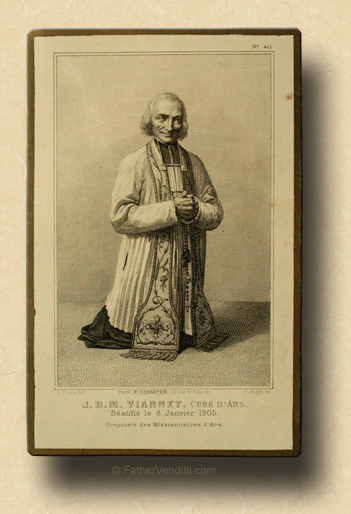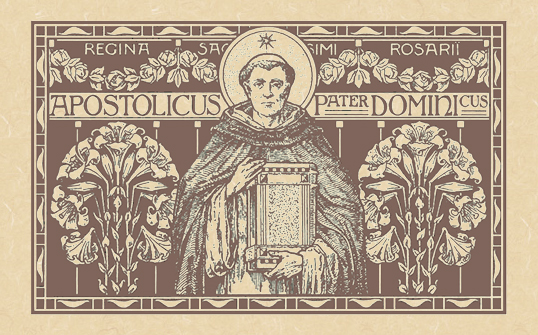We Do Not Define Christ; He Defines Us.
The Memorial of Saint Dominic, Priest.*
Lessons from the primary feria for the Eighteenth Thursday of Ordinary Time, according to the ordinary form of the Roman Rite:
• Numbers 20: 1-13.
• Psalm 95: 1-2, 6-9.
• Matthew 16: 13-23.
|
…or, from the proper:
• I Corinthians 2: 1-10.
• Psalm 96: 1-3, 7-10.
• Luke 9: 57-62.
…or, any lessons from the common of Pastors for Missionaries, or the common of Holy Men & Women for Religious.
|
The Third Class Feast of Saint John Mary Vianney, Confessor; and, the Commemoration of Saints Cyriacus, Largus & Smaragdus, Martyrs.**
Lessons from the common "Os justi…" of a Confessor not a Bishop, according to the extraordinary form of the Roman Rite:
• Ecclesiasticus 31: 8-11.
• Psalm 91: 13-14, 3.
• Luke 12: 35-40.
|
If a Mass for the commemoration is taken, lessons from the proper:
• I Thessalonians 2: 13-16.
• Psalm 33: 10-11.
• Mark 16: 15-18.
|
FatherVenditti.com
|
 10:27 AM 8/9/2019 — Yesterday’s Gospel lesson was about the importance of docility before the will of God, whose ways are not our ways, which is the only way to understand our Blessed Lord's curious treatment of the woman featured in yesterday’s Gospel lesson, who had traveled a great distance to seek our Lord's help for her daughter, and whom the Lord seems to treat very badly at first, but for the purpose of giving an instruction to both her and to His disciples who witnessed the incident. It just so happens that today's Gospel lesson picks up where yesterday’s left off—not exactly but almost—and puts the whole theme of the last few week's into perfect context; for, today, our Blessed Lord explains why it's so important to be docile before the permissive will of God: because He's God! 10:27 AM 8/9/2019 — Yesterday’s Gospel lesson was about the importance of docility before the will of God, whose ways are not our ways, which is the only way to understand our Blessed Lord's curious treatment of the woman featured in yesterday’s Gospel lesson, who had traveled a great distance to seek our Lord's help for her daughter, and whom the Lord seems to treat very badly at first, but for the purpose of giving an instruction to both her and to His disciples who witnessed the incident. It just so happens that today's Gospel lesson picks up where yesterday’s left off—not exactly but almost—and puts the whole theme of the last few week's into perfect context; for, today, our Blessed Lord explains why it's so important to be docile before the permissive will of God: because He's God!
But, like any good teacher, He doesn't just come out and say it; he plays Socrates, and teaches by asking questions, in this case the quintessential question with which every Christian is confronted at some point in his or her life: “Who do you say that I am?” (Matt. 16: 15). But it's interesting to note how He does this: He begins the process of teaching not by asking His disciples who they think He is, but who other people think He is. Two thousand years before psychology was invented, our Lord is a psychologist: He knows that, when you confront someone directly and ask them bluntly what they think, they're going to be defensive and throw up a wall and evade the question; so, He asks them not who they think He is, but “Who do people say that the Son of Man is?” (v. 13 NABRE). By taking them out of the equation, they don't become defensive because He's not asking them about themselves. Not having anything to be defensive about, they feel free to say whatever is on their minds, so they give him a whole catalog of answers: “Some say John the Baptist, others Elijah, still others Jeremiah or one of the prophets” (v. 14 NABRE). But He's not done: now that He's got their defenses down and in a talkative mood, then He confronts them with the personal question: “Jesus said to them, And what of you? Who do you say that I am?” (v. 15 Knox).
Think back to your school days: Sister is in a particularly surly mood. She's firing out questions, ruler in her hand, and woe betide your knuckles if she calls on you and you get the question wrong. But there's always that one annoying kid in the room who thinks he knows everything, who is always the first to shoot his hand up in the air, and whom Sister thinks is the greatest thing since sliced fruitcake. You hate his guts, but on an occasion like this he has his uses; so, you all look at him as if to say, “You handle this one.” So the disciples all look at Simon. Why Simon? He's the favorite. True to form, glorying in the moment, Simon answers the question. Thanks be to God (no pun intended), he gives the right answer: “Thou art the Christ, the Son of the living God” (v. 16 Knox).  And the Gospel goes on to shows us what most everyone regards as the meat of this Gospel lesson: our Lord rewards Simon by changing his name to Peter, which means “Rock,” appointing him Prince of the Apostles and head of the Church, and giving to him the metaphorical keys to the kingdom of heaven, providing the Scriptural basis for Papal Infallibility. All well and good. Long live the Pope! And the Gospel goes on to shows us what most everyone regards as the meat of this Gospel lesson: our Lord rewards Simon by changing his name to Peter, which means “Rock,” appointing him Prince of the Apostles and head of the Church, and giving to him the metaphorical keys to the kingdom of heaven, providing the Scriptural basis for Papal Infallibility. All well and good. Long live the Pope!
But, there's more to this lesson than a Biblical defense of the Papacy; equally important is the question asked by our Lord. Jesus isn't just asking Peter; He's asking all of us: “Who do you say that I am?” And all of us are going to have to figure out how we're going to answer that question, because the consequences of giving the wrong answer are a lot more serious than a ruler to the knuckles. Those who cling to a purely secular and social interpretation of the Gospel would see Jesus as a social and political teacher Who inspires us to be concerned for the poor and the downtrodden and the oppressed; but I doubt they would see Him as any kind of god to whom is owed worship and some form of personal, moral commitment. By contrast, in a previous life I once had a Buddhist coworker who saw in Jesus a spiritual guru with great mystical teachings to impart, but with no understanding of Jesus having any kind of message beyond being at peace with ourselves. The bottom line is: we do not have a right to invent Jesus Christ: He is who He is regardless of what any of us think of Him. Saint Paul in the Epistle to the Hebrews: “Jesus Christ: yesterday, today and the same, forever” (Heb. 13: 8). We do not define Christ; He defines us.

* Born in Calaruega, Spain, Dominic (1170-1221) is remembered for combating the Albigensian heresy, his learning, and his love of poverty. He founded the second of the "mendicant" or "begging" orders of the Catholic Church after the Franciscans, the Order of Preachers, known as the "Dominicans" or "Black Friars" because of the color of the choir mantel worn over their familiar white habit. He is often credited in popular devotion for having a role to play in the development of the most holy Rosary, though this is not supported by any actual historical evidence.
** The Patron Saint of Parish Priests, the Curé d'Ars was born at Dardilly, near Lyons, in 1786. He struggled so in his academic studies in the seminary that his ordination to the priesthood was delayed because of concern for his intellectual qualifications. As parish priest of the obscure village of Ars, he became famous as a spiritual director and confessor, causing his obscure parish to become a major center of pilgrimage; he often spent as many as 18 hours a day in the confessional. When the seers of La Salette reported apparitions of the Mother of God, they were sent to him to be interviewed, and he declared them to be frauds; the Church ended up approving the apparitions anyway. He died on August 4th, 1859, and was canonized in 1925.
Cyriacus, a deacon, and his two friends, Largus and Smaragdus, where put to death during the presecution of Diocletian in the year 303.
|

